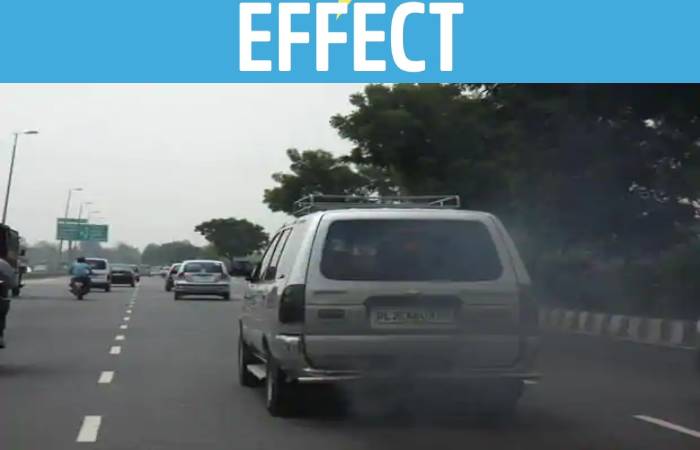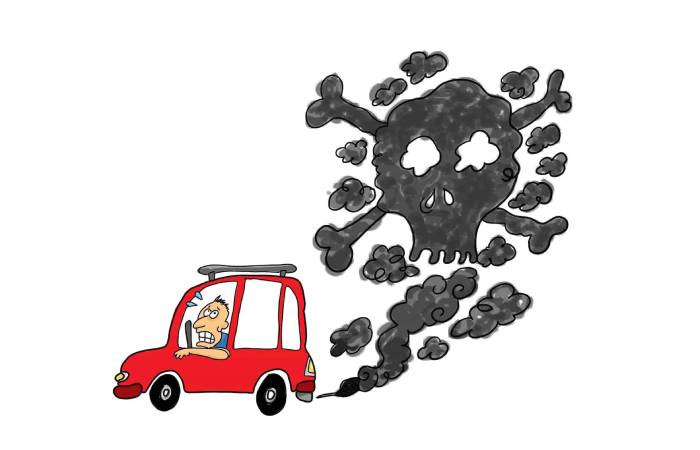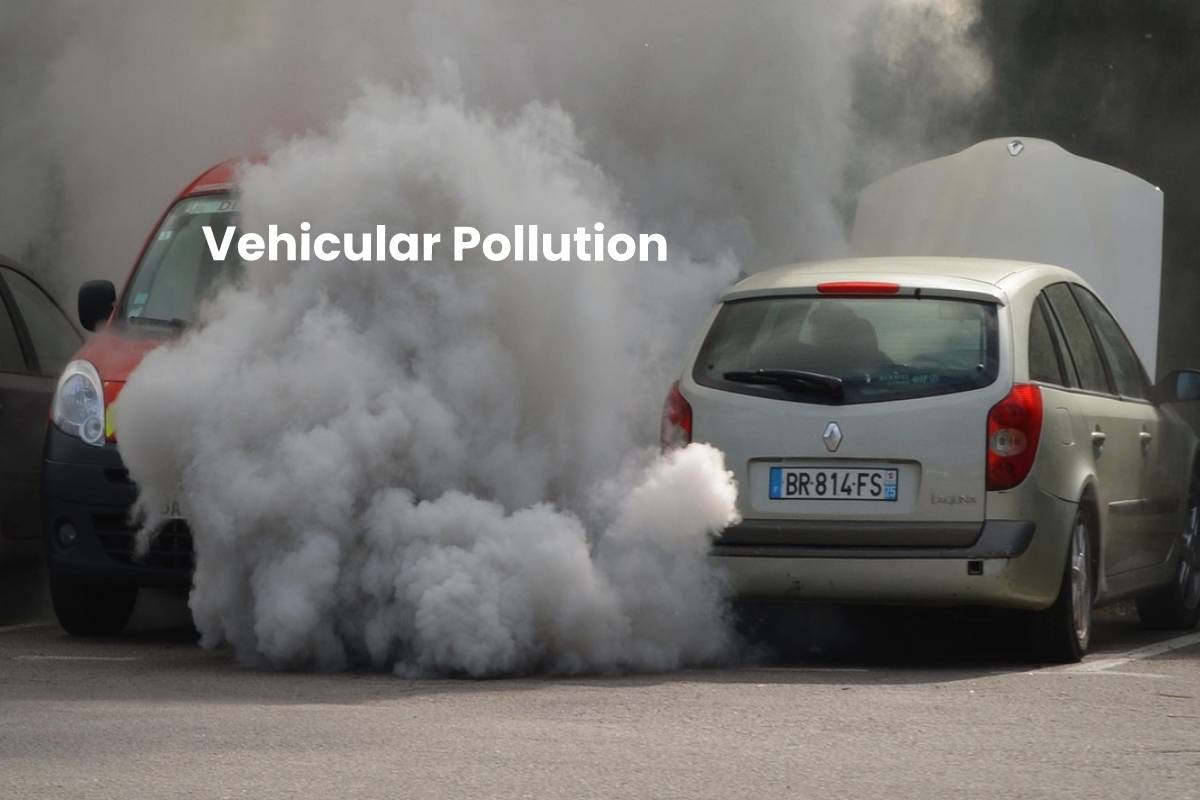Table of Contents
Vehicular Pollution Definition
Vehicular pollution is the introduction of harmful material into the environment by motor vehicles. These materials, known as pollutants, have several detrimental effects on human health and the ecosystem.
Transportation is a significant source of air pollution in many countries worldwide due to the high number of vehicles available on the roads today.
An increase in purchasing power means that more people can now afford cars, which isn’t good for the environment. Vehicular pollution has grown at an alarming rate due to increasing urbanisation in India.
Air pollution from vehicles in urban areas, particularly in big cities, has become a severe problem. The pollution from cars has begun to tell through cough, headache, nausea, irritation of eyes, various bronchial and visibility issues.
Ingredients of Vehicular Pollution
The following are the major pollutants associated with motor vehicles:
Ozone
- The primary ingredient in urban smog, ozone, is created when hydrocarbons and nitrogen oxides—both of which are chemicals released by automobile fuel combustion—react with sunlight.
- Though beneficial in the upper atmosphere, the ground-level ozone can irritate the respiratory system, causing coughing, choking, and reduced lung capacity.
Particulate Matter
- These particles of soot, metals, and pollen give smog its grey colour. Fine particles pose the most severe threat to human health by penetrating deep into the lungs among vehicular pollution.
Nitrogen Oxides
- These vehicular pollutants can cause lung irritation and weaken the body’s defences against respiratory infections such as pneumonia and influenza. Also, they assist in the formation of ozone and particulate matter.
Carbon Monoxide
- This odourless, colourless gas is formed by the combustion of fossil fuels such as gasoline. Cars and trucks are the sources of nearly two-thirds of this pollutant.
- When inhaled, CO blocks oxygen to the brain, heart, and other vital organs in the human body.
- Newborn children and people with chronic illnesses are especially susceptible to the effects of CO.
Sulfur Dioxide
- Motor vehicles create this pollutant by burning sulfur-containing fuels, especially diesel. It can react in the atmosphere to form fine particles and pose a health risk to young children and asthmatics.
Hazardous Air Pollutants
- These chemical compounds emitted by cars, trucks, refineries, gas pumps, and related sources.
Causes of Vehicular Pollution
- The leading cause of vehicular pollution is the rapidly growing number of vehicles.
- The other factors of vehicular pollution in urban areas are 2-stroke engines, poor fuel quality, old vehicles, inadequate maintenance, congested traffic, poor road conditions, old automotive technologies, and traffic management system.
Effects of Vehicular Pollution

These are some of the consequences of pollution:
1. Global Warming
- The emission of greenhouse gases into the atmosphere leads to the depletion of the ozone layer, and this causes global warming.
- This is adverse weather that more often than not results in loss of life and property.
- Global warming is a concern for many central world governments, and deliberate efforts have been made to reduce it.
- With the ozone layer depleted, the sun’s harmful ultraviolet rays can reach the earth’s earth’s lower surface and harm humans and other living organisms on the planet.
2. Poor Quality of Air
- There are countries where air quality is so poor that people wear masks to reduce harmful substances inhaled.
- It is not something to smile about because aside from the fact that you have to walk around with a mask all day, which is not comfortable, there is also the possibility of health complications.
- Countries that have a high number of old vehicles generally have a problem when it comes to this.
- It’s the reason why many governments have also banned the importation of vehicles older than a certain number of years.
3. International Reputation
- Cleaning up the atmosphere is a serious concern globally. This is why so many climate summits are held annually to make agreements on each nation’s responsibility in cutting down greenhouse emissions.
- A country with a high level of vehicle pollution risks damaging its reputation and standing on the world stage.
4. Health
- These pollutants can lead to lung infection and cancer. As we know, hydrocarbons are not very good for human health.
- They can cause heart disease, aggravate asthma, damage the central nervous system and make breathing difficult.
- Fuel spillage can also affect the health of plants and marine life. When left unchecked, these health conditions can cause death.
- Treating diseases, such as cancer, requires a lot of money when a country’s population is primarily unwell.
- The economy stalls because growth is usually pegged on the ability of people to work and earn income.
5. Tourism
- Most people would not willingly go to visit countries that they know are bad for their health.
- It will, in turn, result in a reduction in the number of tourists to those countries and subsequently loss of foreign exchange income.
6. Smog and Acidic Rain
- Nitrogen oxides contribute to the formation of highly corrosive smog that speeds up rusting of vehicles.
- When nitrogen oxide dissolves in the rain, acidic rain is formed. Water harvested from this type of shower cannot be fit for human, plant or animal consumption.
- These harmful effects of vehicle pollution are why every person’s responsibility is to reduce or eliminate environmental pollution.
- The actions of a small group can put a more significant demographic in harm’s way.
Reduction of Vehicular Pollution

Even if they cannot eliminate vehicle pollution, it can still be reduced to manageable levels. What are some of the things that individuals, governments, and organizations can engage in to mitigate the effects of pollution caused by transportation? Here are some actionable pointers:
1. Civic Education
- Ignorance is not bliss, and education is the key to success. Many people do not care about the effects of pollution because they are not aware of them.
- One cannot fight to protect what they value without knowing that there is an impending danger.
- Carrying out civic education by government departments and non-governmental organizations can play a significant role in awakening society to the realities of pollution and reducing it to make the world a much better place to live.
- It can be done through community organizers or taught in schools as part of the curriculum.
- It would be counter-productive to keep on talking about the need to reduce vehicle pollution without making people understand why that is necessary.
- A sense of responsibility should be cultivated in everyone so that there is a desire and willingness to do what is right.
2. Progressive Policies
- Creating reasonable regulations that anticipate the ‘s challenges the modern world’s challenges in reducing vehicle pollution can help mitigate it.
- Lawmakers should draft legislation that will make people do the necessary as far as bringing down the levels of vehicle pollution is concerned.
- Such laws can include placing a cap on the age of vehicles that can import, setting out guidelines on roadworthy vehicles’ conditions, and creating agencies that will look into alternative fuels such as green energy.
- On the global front, world leaders should agree on standard practices for eliminating or reducing pollution.
- These should be adopted so that every nation does its part in achieving the desired results.
- Citizens should also hold their leaders to account and push them to have strategies to reduce environmental pollution in their campaign manifestos.
3. Vehicle Maintenance
- This is more of personal responsibility than it is universal. One should ensure that their car is in good condition and does not release harmful substances into the atmosphere.
- Regular car maintenance can help in repairing or replacing worn-out parts. When this is done, the vehicle performs optimally, and fewer pollutants are released into the air.
- Things like replacing oil filters, changing the engine oil and greasing should do the moving parts regularly.
- Carelessness is the reason why some vehicles release dark harmful smoke while they are moving on the roads.
- This is especially harmful to those outside because they inhale the smoke and the dangerous matter.
4. Discard old Vehicles
- Old vehicles should be discarded or returned to the manufacturing company so that they can acquire new ones.
- They contribute highly to environmental pollution and can also cause accidents on the roads. Getting rid of them would be a double win.
- Unfortunately, many people attach sentimental value to such cars without knowing what that does to the ecosystem. A change in thinking would lead to better practices.
5. Carpooling
- People from the same neighbourhood and who work in the same area should consider carpooling.
- This would reduce traffic jams, save money used on car fuel and maintenance and contribute towards having clean earth.
- That is what would make sense. On the flip side, neighbours would also have more time to bond. This enhances unity and harmony within society.
6. Alternative Means of Transport
- It wouldn’t hurt to use alternative means of transport even if you have a car. One can ride a bike, train or bus to work.
- Walking is also an option when your workplace is not that far off from your place of residence. Riding bikes, as well as walking, provide great exercising and fitness regimen options.
- Many people leave work when they are already tired and don’t have time for fitness routines to make a fun option for staying healthy.
- It’s also cheaper than using your car, which would still need fuelling, maintenance and set you back a couple of bucks in parking fees.
- Using this alternative means of transport is the smart choice.
7. Protective Wear
- To reduce the amount of pollutant inhaled, a person can consider putting on pollution masks.
- In countries where pollution is high, and air quality is inferior, this is a common practice.
- Since you can’t reduce or eliminate pollution and its effects all by yourself, it would be wise to protect your health.
- Pollution masks help filter the air you breathe so that you don’t inhale a lot of impurities. The responsibility for your health starts with you.
Conclusion
It’s often been said that we only have one earth and should do everything to protect it.
One cannot afford to sit on the sidelines and watch because everyone affects when it comes to pollution, even the ones that did not contribute to it.
Vehicle transportation is one of the leading causes of air pollution the world over. The good thing is that something can do about it. It begins with individual responsibility in having a cleaner planet.
When people change their mindsets and become more proactive, a lot of good things can achieve. In the same manner, vehicle pollution can also reduce and managed.


